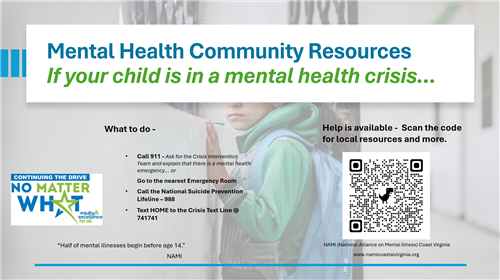- Norfolk Public Schools
- Mental Health Awareness
Student Support Services
Page Navigation
- Overview
- Academic Support
- Behavioral Support
-
Student Registration Support
- Compulsory Attendance Law
- Custody/Residency
- Out-of-District Transfers
- Report of Out of Zone Student
- Home Schooling
- Student Registration
- Required Registration Documentation
- Student Registration -
- Physicals and Immunizations
- Foreign Exchange
- Delay Entrance into Kindergarten
- Tuition Rates
- Military Families
- McKinney Vento Application 2024-2025
- Family Educational Rights and Privacy Act (FERPA) & Protection of Peoples Rights Amendment (PPRA)
- Contacts
- Transition Support Services
- Student Records & Record Requests
- Bullying
- S.A.F.E. (Suicide Awareness For Everyone)
- Community Resources
- Mental Health Awareness
- Title IX Coordinator
- CPS Mandated Reporter Update
- Transcripts/Student Records
- Attendance Guidance for SY2023-2024
- National Child Abuse Prevention Month
- Home Schooling
- Registration Guide
Norfolk Public Schools Shares Important Mental Health Resources
-

Mental Health in Youth - The Signs
Fast Facts
- 1 in 5 U.S. adults experience mental illness each year.
- 1 in 20 U.S. adults experience a severe mental illness each year.
- 1 in 6 U.S. youth aged 6–17 experience a mental health disorder each year.
- 50% of all lifetime mental illness begins by age 14, and 75% by age 24.
- Suicide is the 2nd leading cause of death among people aged 10–14.
- People with depression have a 40% higher risk of developing cardiovascular and metabolic diseases than the general population.
- High school students with significant symptoms of depression are more than twice as likely to drop out compared to their peers.
- 1 in 5 young people report that the pandemic had a significant negative impact on their mental health.
- Students aged 6-17 with mental, emotional, or behavioral concerns are 3x more likely to repeat a grade.
Retrieved from National Alliance on Mental Health
Source: Data from CDC, NIMH, and other select sources.
Find citations at nami.org/mhstats
Supportive families, communities, and resources can help youth build strong foundations for lifelong well-being.
- By teaching children and teens coping skills, we can empower them to take charge of their mental health.
- Know the signs of mental health issues in children and teens. Early diagnosis and treatment can save lives.
- Start the conversation early: talking about mental health can help children and teens build coping skills and feel comfortable with their emotions.
- Nurturing relationships and environments are important for helping children and teens develop good mental health and manage life stressors in healthy ways.
- Good mental health increases the ability of children and teens to practice self-care and face challenges with resilience.
Where to Find Help and Resources
- Suicide and Crisis Lifeline: Call 988 or Text HOME to 741741


-
NAMI Coastal Virginia Community Resources
-
2021-22 Counseling and Community Resource Guide

